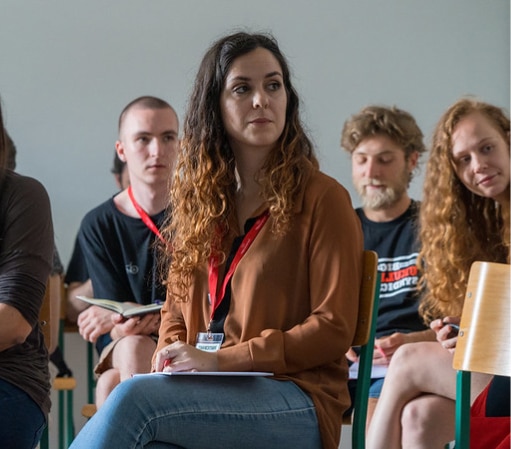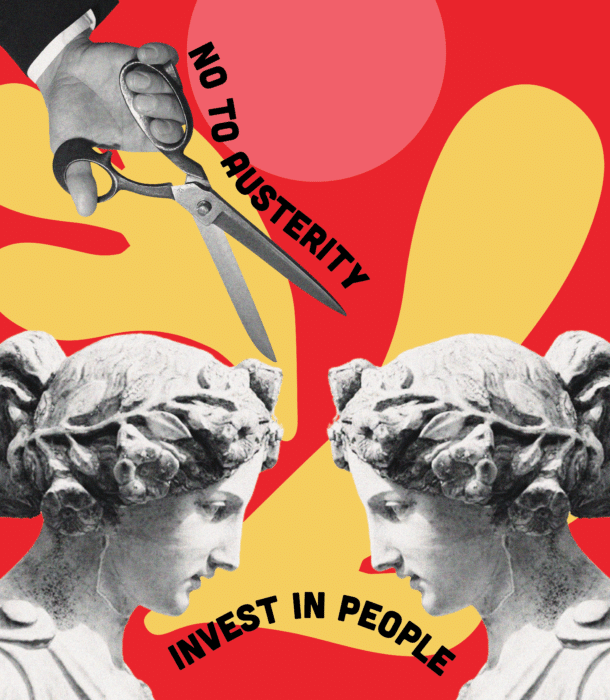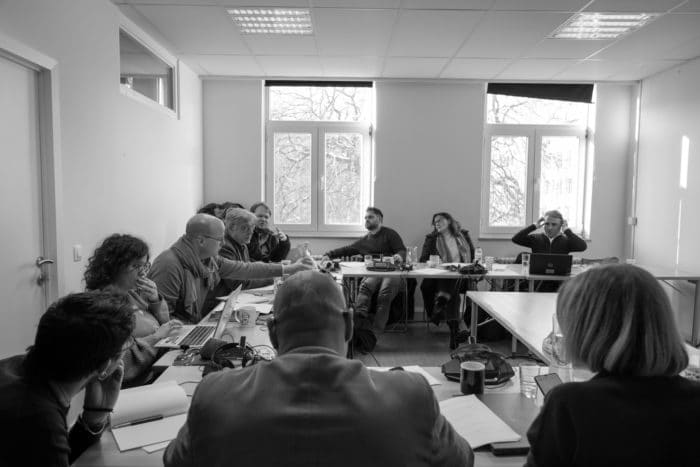Life before
profits

Europe is a place of considerable confrontation between those who own everything and those who have almost nothing.
This system is under attack by capitalist liberal reforms, and we need to be clear: the European institutions, with the active complicity of the governments of the Member States, have put themselves at the service of this dynamic and have enshrined this logic in text after various treaties.
Access conditions for populations are deteriorating, while access costs are rising, which degrades the standard of living of inhabitants. In this context, the European Union does not know how to respond to economic and social needs.
Competition, liberalism, and opposition to public investment remain relevant in European integration instead of putting people at the heart of public policies.
Yet new potentialities can open up based on social movements. In Europe, we are living in a moment of renewed struggles over wages, pensions, housing, feminist issues, and ecological demands. Social movements are vital points of support.

Protect, develop, and create social shields against the crisis:
The answer to basic needs requires public services and social protection
The cost of living in Europe has steadily risen over the last few years, making it increasingly difficult to access everyday consumer goods, manufactured goods, and services. All services, from culture to health, via postal services, telecommunications, audiovisual services, local public services, and public research, are under attack from all sides, despite being the key to building a society of human progress.
Energy is a vital need, but subjecting its supply to market laws leaves the field open to speculation. The transport of goods and people is central to the planet.
Access to passenger ground transportation is now more than ever a fundamental issue: how can we tolerate the fact that Europe’s major capitals are no longer connected by direct rail lines and that air travel is the primary means of transport for the citizens between Member States? Access to quality food at low cost has become an economic, environmental, and public health issue, particularly in terms of poverty.
Poverty
and extreme poverty are widespread in Europe, and all public policies must be mobilised to eliminate these scandalous inequalities. It is imperative that the EU finally adopts an integrated European anti-poverty strategy that tackles the multidimensional problem of poverty and social exclusion.
Public services
must provide access to fundamental rights. For the vast majority, increased provision of public services is the only social shield to reduce the cost of living. The inflation caused by first capitalist speculation and then war shows the will of the European ruling classes to transfer the costs of the crisis to the population by putting upward pressure on prices and maximising their profits, while real wages fall and social and economic inequalities grow at a dizzying pace.
The right to housing:
Housing is a critical issue, with high prices and a lack of supply. Gentrification, speculative investment, the scarcity of affordable land, declining public funding for social housing, and inadequate regulation of the housing market are all contributing to the housing crisis. Millions of homes are unoccupied, and buildings stand empty without being repossessed.
The housing crisis results from the neo-liberal policies of the EU and its member states. The results are: more precarious housing conditions, increased evictions, repossessions and homelessness, and gentrification of neighbourhoods.
More than 20% of the total population in Europe is affected by this serious insecurity. In addition, the urban building stock has a significant impact on the urban environment – regeneration and reduction of land use are a priority for climate neutrality.
The right to education:
Inequalities in access to and outcomes from education are very worrying, with significant gaps between students from disadvantaged socio-economic backgrounds and those from more advantaged backgrounds.
Public schools, under attack from liberal policies, are deteriorating, while the expensive for-profit private sector, which also benefits from unjustifiably large amounts of public funding, is a booming market for the wealthy. Education should prepare citizens for the future and be free of any prejudice based on social origin, ethnicity or gender. Inequalities in access to information and communication technologies, educational resources, and appropriate learning spaces threaten the educational success and well-being of students.
Schools must be free of charge and free from the influence of private or religious interests.
We are fighting against the reproduction of sex and gender stereotypes in education. Universities and research institutes must be free from economic pressure.
We reject the Bologna Process, which promotes the privatisation of higher education by imposing extremely high tuition fees for university studies, forcing students to pay huge sums for housing or materials for their studies.
We fight for the possibility of international exchanges for students and for research, which should not be dependent on their economic capacity.
The right to health:
Health systems, including hospitals in all European countries, are suffering the adverse effects of policies to reduce public spending, and are seeing financial criteria take precedence over the quality of patient care in their management, resulting in the exhaustion of the sector’s workforce and causing a loss of purpose in their professions.
The global effort to develop and distribute vaccines has also highlighted the challenges of international cooperation and intellectual property in the health sector.
The pandemic has highlighted the problems associated with the outsourcing of our industry and the lack of public control over strategic issues such as research and the production of pharmaceuticals like medical supplies.
This is a strategy to create shortages.
The oligopoly of pharmaceutical companies has allowed them to reap enormous profits from this pandemic without being willing to provide universal access to vaccines and medicines. The biomedical research system, as indispensable as it is, is being diverted from its mission of defending the health of humanity and is being directed solely towards the centrality of maximum profit for the pharmaceutical oligopoly.
Social protection
is a major issue in Europe. Social security coverage for health, pensions and unemployment insurance significantly reduces poverty rates. All social protection systems, including pensions, are called into question by the orientations of the Member States and the orientations of the European Commission, which promotes a privatisation strategy. We reject this approach of imposing privatisation, especially of pension funds. Reforms that claim to strengthen the “financial sustainability” of social protection systems are dictated by the search for capitalist profitability and call into question social gains and citizens’ rights instead of organising a social shield.

Organisational principles of the public sectors
The European institutions, along with governments committed to the theses of neo-liberalism, have used all their weight to break the specific logic of public services and prioritise the interests of the financial markets over the general interest. The European treaties and the legislation or jurisprudence they have generated have served as vectors for this effort, to reduce public spending at all costs and provide multinationals and the financial markets with new fields for the profitability of capital.
A deteriorating service, higher prices, poor access, poorer living conditions for users, and poorer working conditions for employees: the collective consequences of these policies have been disastrous. The crises have revealed the serious dysfunctions on the European continent and have raised awareness of Europe’s unpreparedness for a major crisis.
For new economic, social, and environmental efficiency, public services must make it possible to concretise access to fundamental rights. This characteristic implies that they must be accessible to all, in all areas. Therefore, a massive investment plan is needed. It also puts into perspective the need and the role of the State as an employer.
The increasing precariousness of working conditions is mainly manifested in the process of “uberisation“, which we challenge by demanding that everyone, employers and workers, including digital platforms, enjoy equal rights and obligations. This uberisation mainly affects young people and immigrant workers.
Austerity policies and the transformation of the labour market, with the rise of self-employment and temporary contracts, have made it harder for young people to secure stable, well-paid jobs. They are more affected by educational inequalities and mental health problems, including pressures related to academic performance, economic insecurity, and exposure to social networks. We refuse to allow young people to be used to violate labour rights through unpaid internships.
Women make up most of the public service workers, especially in the social sector. This has historically allowed them to enter employment and secure contracts, but wages are very low. The precariousness of female workers is evident: more than 95% of childminders, domestic workers, home helpers, and home assistants remain women. Unpaid domestic and care work allows capitalism to reproduce generations of male workers with minimal domestic labour and maximum profit at the expense of women. Women make up 91% of care assistants, 87% of nurses, 73% of cleaners, 76% of cashiers and shop assistants, 71% of teachers… Hand in hand, patriarchy and capitalism benefit from the devaluation of women and their work. The whole organisation of our society is based on these two dominations. Women bear the majority of informal care responsibilities, making them particularly vulnerable to changes in the care sector and exposing them to increased risks of poverty and social isolation. Women are the first to suffer from the weakening of public services.
The public sector must massively recruit, be a good employer, pay properly, listen to employees on how to organise work, and not impose part-time work. Resources and funding must be sufficient to ensure that work is emancipatory and that workers no longer bear the ethical burden of a job poorly done.
Artificial intelligence (AI) can be a huge asset in solving increasingly complex social and environmental problems, but it can also be a danger if used by malicious actors, or if left to the capitalist market. This means establishing European sovereignty in this field and defining ethical criteria for its use. We want public control of AI, defining a set of rules to authorise the use of algorithms. Beware of the illusion of the dematerialisation of public action, which, under the guise of facilitating procedures, contributes to sideline entire sections of the population and is often designed to disguise a decline in public services.

The concrete and applicable proposals to which we are committed
Cost of living:
- The development of social protection by increasing social rights and guaranteed incomes.
- Higher minimum wages, security of employment contracts, job development, and a systematic right to quality paid training for workers and the unemployed.
- Energy pricing rules must be replaced by a cooperative approach and prices in line with production and development costs.
- A European Pillar of Social Rights based on twenty principles relating to equality and access to training and the labour market, fair working conditions, social protection, and inclusion. These principles, together with an action plan, should lead to concrete initiatives in favour of citizens.
- Economics of care / social protection: we take up the concept of “Just transition”[1] defended by the trade unions, which combines ecological transformation with social protection.
- We call for the extension of social protection from childcare to pensions.
public services:
- Massive investment in infrastructure to improve the quality and accessibility of services. The construction and renovation of buildings financed by the ECB through interest-free loans to States and local authorities.
- Public investment programmes focused on the environment to promote the ecological transition.
- A process of democratic transformation. Users and local representatives must have effective powers over their strategic orientations, over the ways in which needs are met, over the material and human resources to be deployed, and over the evaluation of management according to criteria of collective, social and environmental efficiency.
- Resources for training and recruiting staff in sufficient numbers, with working conditions that enable them to carry out their duties. They must be given new powers over management, investment and research decisions and over the organisation of work.
- The definition of the scope and missions of public services must be a matter for parliaments and even for popular consultation.
- The creation of an independent observatory of public services in Europe, within the bodies of the European Commission, to measure and evaluate improvements or deteriorations in these services.
- A European fund for ecological and social development, public services and employment, financed by the creation of money by the ECB at zero or even negative interest, as Article 123.2 of the Lisbon Treaty allows, and with democratic governance.
- European cooperation between the main national public services. Cooperation in Europe and throughout the world must be promoted through solidarity-based approaches.
- Europe must achieve equal rights for women and men in terms of pay, working conditions, career development and participation at all levels, especially in all public services.
- Democratic governance of artificial intelligence with ethical criteria must be established. Provide ethics training for all links in the “algorithmic chain” (designers, professionals, citizens). Digital literacy must make algorithmic systems comprehensible by strengthening existing rights and organising mediation with users. Set up a European platform for auditing algorithms. Encourage research into ethical AI. Strengthen ethical controls within companies.

housing:
- Progressive taxation of empty dwellings, expensive properties and large dwellings, removal of incentives and subsidies for surpluses arising from the exchange or abandonment of properties, and the power to take over long-term empty buildings in public ownership.
- The revenues from these measures will be redirected to public housing and energy programmes.
- Exempt public housing funding from internal market and competition rules.
- EU funds for investment in social housing must be used in the public interest – not at speculative prices.
- Structural intervention to increase the supply of social housing and the use or conversion of empty public buildings – such as military sites.
- Reversing the financialisation and securitisation of housing debt.
- The creation of European instruments to cap rents, restrict short-term rentals and regulate the property market, to break speculative prices and prohibit foreclosures and evictions when a Member State fails to provide adequate housing.
- Public investment to end energy poverty and improve the energy efficiency of buildings.
- Linking housing policy to social cohesion, energy saving, and ecological transition.
education:
- A major plan for cooperation and concrete action against all forms of discrimination and against social inequalities in educational success, to combat educational difficulties and promote the unconditional acceptance of all migrant children.
- The generalisation of compulsory, public and secular education for children and young people and effective free education in all EU countries.
- Maintain or develop, depending on the country**, a vocational secondary education** with public status, not influenced by employers.
- Include European cooperation modules in the training of teachers, to promote exchanges and the production of research, and the development of practices aimed at combating social inequalities in educational attainment and discrimination.
- A European cooperation plan for the development of higher education and research.
- European study and research grants for students, based on social criteria, promoting and facilitating European exchanges in training courses from secondary to university level.
- Quality public funding for all schools and universities in Europe and a ban on public funding for private schools in Europe.
- The European harmonisation of diplomas must no longer take place from the bottom up; training must escape from the imposture of competence-based training, which individualises the recognition of diplomas vis-à-vis future employers: the diploma must be a collective guarantee.

health:
- Establishment of a European Public Health Centre to coordinate activities in this sector in the public interest.
- Ensuring universal and free access to care, and strengthening public health systems to reduce inequalities.
- Increased support for health professionals, recruitment, training time and salary increases.
- Strengthening and democratising the care economy by promoting greater recognition and valorisation of informal care work, supporting family assistants and developing home care and support services for professionals. We fight for migrant workers to have the same rights.
- Democratic control of the pharmaceutical industry and guarantee of its operation according to criteria other than the rate of profit; creation of a European public medicines hub that intervenes throughout the cycle of medicines, technologies and vaccines at affordable prices at the service of humanity.
- The protection of the environment and ecology must be integrated into a health strategy.
- We raise the health issue of access to sustainable and quality food to counter the choices of the market.
- Demand free patents on vaccines and unequivocal support for the “No Profit on the Pandemic” campaign.
- Defend reproductive rights, free and open family planning, including the right to abortion. We want Europe to regain sovereignty and independence in the production of abortion pills.

conclusion:
For the Party of the European Left, it is a matter of urgency to combat the poverty into which the peoples of Europe are sinking. All the peoples of Europe must be guaranteed upward alignment in all areas of human rights and social protection. We want to support the creation of new public services everywhere in order to extend these areas of protection against capitalism and thus promote a new economic, social, and ecological efficiency. Public services and social protection can be valuable points of support in the process of overcoming capitalism, essential for human progress to find a way out of the systemic crisis and the challenges of the historical period we are experiencing. Public services are existing furrows to dig new paths for humanity.
[1] “Just transition means transforming the economy in a fair and inclusive way to ensure that good quality jobs are maintained and created” (IndustriALL, Just Transition Manifesto)
News about life before profits

Related press releases
Relevant Working Groups

contact us!
Want to join the EL ? Any questions ?
Get in touch with us by mail, we will get back to you as soon as possible.

